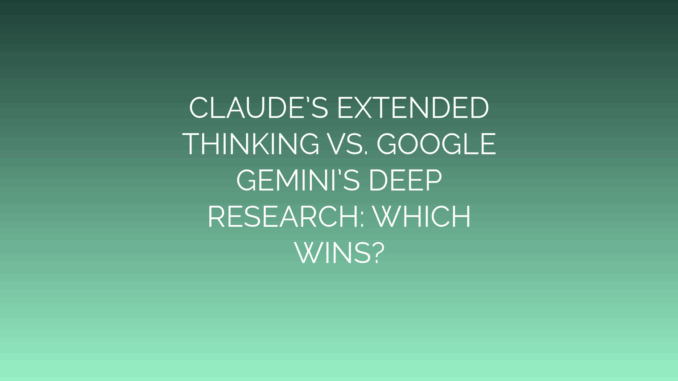
Claude’s Extended Thinking vs. Google Gemini’s Deep Research: Which Wins?
The rapid evolution of generative AI has spotlighted two distinct approaches: Claude’s Extended Thinking and Google Gemini’s Deep Research. These methodologies define how each AI assistant processes information, solves problems, and supports users. But which approach delivers superior results? This article dissects their strengths, limitations, and ideal use cases to help you choose the right tool for your needs.
Understanding Claude’s Extended Thinking
Developed by Anthropic, Claude emphasizes nuanced reasoning, creativity, and longitudinal analysis. Its Extended Thinking framework enables:
- Multi-step reasoning: Breaking complex queries into intermediate steps for logical coherence.
- Long-context processing: Analyzing extensive documents (e.g., 100K+ tokens) to identify patterns and connections.
- Ethical alignment: Prioritizing safety and harm avoidance via constitutional AI principles.
- Creative synthesis: Generating original ideas, narratives, or strategies by connecting disparate concepts.
Claude excels in scenarios requiring deep reflection, such as drafting research proposals, editing manuscripts, or brainstorming business strategies. Its strength lies in understanding intent and generating humanlike, contextually rich outputs.
Exploring Google Gemini’s Deep Research
Google Gemini leverages Google’s vast data infrastructure for realtime, evidencebased responses. Its Deep Research approach focuses on:
- Real-time web access: Integrating live Google Search, Scholar, and Workspace data for factual accuracy.
- Multi-modal processing: Analyzing text, images, audio, and code simultaneously (especially in Gemini Pro/Ultra).
- Source grounding: Citing credible references like academic papers or news sites to validate claims.
- Technical optimization: Delivering concise answers with high precision for STEM, coding, or data analysis.
Gemini dominates tasks needing uptotheminute information, such as market analysis, coding assistance, or datadriven decisionmaking. Its integration with Google’s ecosystem makes it ideal for productivity workflows.
Critical Comparison: Strengths and Limitations
Accuracy and Depth
- Claude: Superior in open-ended exploration, mitigating hallucinations through self-critique. Struggles with real-time verification.
- Gemini: Excels in factual rigor due to sourced data. May overlook nuanced interpretations without explicit queries.
Creativity vs. Precision
- Claude: Generates inventive solutions for ambiguous challenges (e.g., marketing copy, ethical dilemmas).
- Gemini: Prioritizes efficiency—better for structured problems (e.g., debugging code, summarizing research papers).
Technical Prowess
- Gemini: Integrates seamlessly with tools like Google Sheets, Python, or BigQuery for technical tasks.
- Claude: Less optimized for tool-augmented workflows but excels in API-based document analysis.
User Experience
- Claude: More conversational and adaptive to feedback, ideal for iterative refinement.
- Gemini: Faster output but sometimes over-simplifies complex requests.
Use Cases: When to Choose Each Tool
Optimal Scenarios for Claude
- Legal document review requiring contextual interpretation.
- Long-form content creation (e.g., novels, whitepapers).
- Workshops or ideation sessions needing ethical oversight.
- Analyzing qualitative data from interviews/surveys.
Optimal Scenarios for Gemini
- Competitive analysis using real-time market data.
- STEM education or code generation with citations.
- Verifying claims against recent studies/news.
- Multimodal tasks involving image-to-text extraction.
Synergy Over Supremacy
Neither model universally “wins.” Their value depends on context:
- Combining Both: Use Gemini for rapid fact-checking and Claude to refine insights into actionable strategies.
- Future Trajectories: Claude aims for deeper reasoning via Extended Thinking, while Gemini invests in scalable Deep Research via Google’s infrastructure.
The Verdict
Choose Claude if you prioritize creativity, ethical alignment, and longitudinal analysis. Choose Gemini for realtime data, technical precision, and multimodal agility. Both tools redefine productivity—but their convergence will ultimately shape the next frontier of AI problemsolving.
Final Notes for Clarity:
- Extended Thinking favors depth over speed.
- Deep Research excels in breadth and recency.
- Hybrid workflows leveraging both deliver maximum value.
As LLMs evolve, the distinction between reasoning and research will blur, making ethical design and usercentricity the ultimate benchmarks. For now, understand your goals—and let that guide your choice.
Leave a Reply